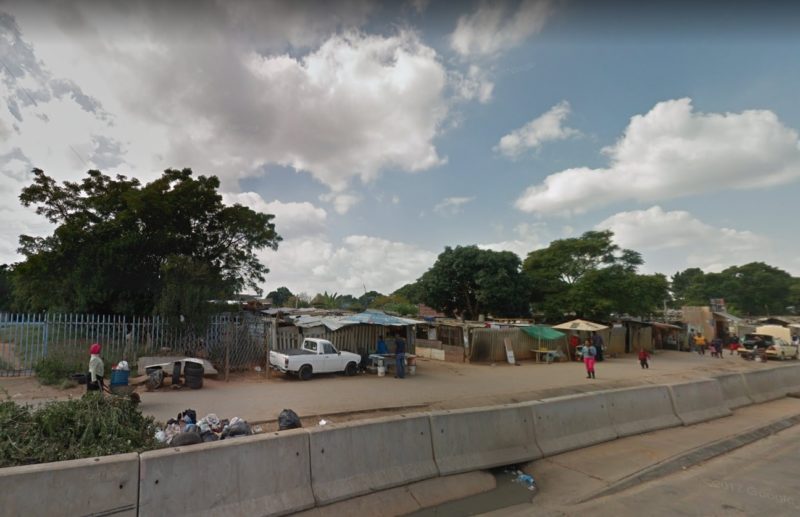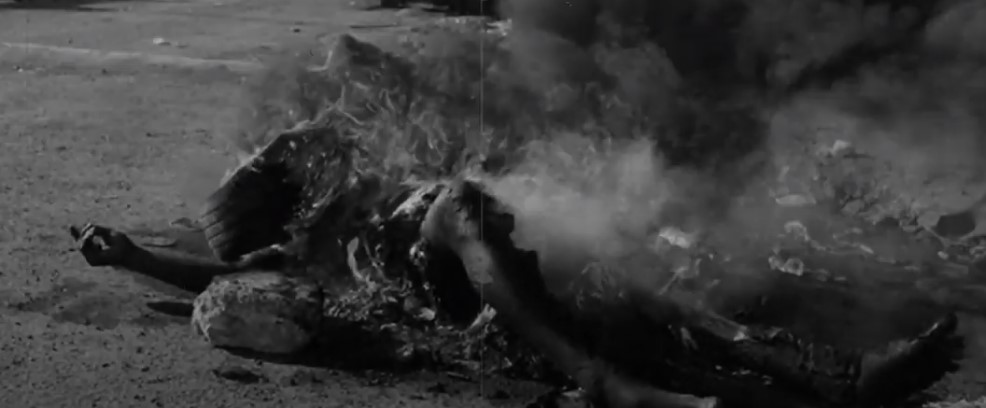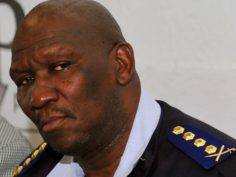Violence, retribution and the South African justice system
However one looks at it, the country has lost its way: the South African police are not in a position to handle crime effectively, declared the ANC’s own chair of the parliamentary portfolio committee on police Ms. Tina Joemat-Pettersson in November 2020. For four years in a row, the police service could only garner a qualified audit because the department did not fulfil the requirements set out for a clean audit. Reasons such as unauthorised spending and the poor quality of the department’s financial affairs were given for this failure.
Published: June 3, 2021, 9:44 am
Fast forward six months to the same department’s quarterly report on crime and violence. At a media conference on 14 May 2021, minister of police Bheke Cele admitted to a plethora of failures, including nearly five thousand murders from January to the end of March this year, up 8,4 percent from the same period last year. (These are just the cases reported!) One is not even safe in one’s house: more than 1320 people were murdered in their own homes during that period. In one Johannesburg suburb, there were 68 house breaks in three months, while an average of 105,5 people were raped every day in the same period. More than 75 000 assaults occurred in the relevant quarter, while heavy vehicle hijacking jumped by 25 percent from the previous quarter to 354 during the current period.
What is of great concern to the commercial farming industry is stock theft, with 689 reported cases during the past three months in the province of Mpumalanga alone. More worrisome is the arbitrary use of hunting dogs on private farms (without the consent of the farmer in most instances). Dog packs under the control of syndicates bet huge amounts of money on how many animals (both wild and sometimes domestic) can be killed by the dogs. Some farmers’ properties are arbitrarily invaded by the syndicates and farmers who complain are told to keep away otherwise their farms will be destroyed and their grazing burnt. Eleven people were murdered in the past three months on farms: four were farm owners.
More than 2170 police vehicles in Gauteng province are out of order, 763 more than in November last year. This makes a third of Gauteng’s police vehicles immobile, unrepaired. More than 208 000 DNA tests are awaiting processing, with specific reference to murder and rape cases. Minister Cele says the current situation gives him “sleepless nights” but these are crocodile worries. There are critical vacancies in the police forensic laboratories but ads for these jobs specify that affirmative action applicants need only apply. This rules out whites as candidates for these important jobs. Detectives complain they cannot work properly – their departments are so starved of support and finance that they have to pay for their own uniforms, for finger printing powder and even for flashlights. They pay if they get a flat tire, and they pay to fill up at the local petrol station. There is zero leadership in the SA police force, it is reported. (Rapport 21 March 2021)
Break-ins and theft from police stations have increased: there were more than 136 break-ins in 29 police stations over the past five years. Many of them were to steal crime dockets, weapons and supposedly under-lock-and-key drugs.
Violence
This parlous law and order situation means whole pockets of South Africa are without regular and visible policing. South Africa is a violent society. Many scores are settled “out of court” so to speak. Violence is and has always been the ANC’s calling card. In his book “Secret Revolution- Memoirs of a Spy Boss” (2015), Neil Barnard describes negotiations between former president PW Botha and Nelson Mandela where Botha refused to release Mandela unless the latter eschewed violence. Mandela continually refused, declaring that violence “was all that my people know”. With history as witness, the ANC came to power on a tsunami of violence. It was their modus operandi to get what they wanted. It was a winning tool in their struggle to take South Africa and it has worked ever since. After his release, Mandela told a Cape Town press conference (June 3, 1990) that “the only type of violence we accept is organised violence in the form of armed action which is properly controlled and where the targets have been carefully selected.” In response to his statement, attacks on police increased four-fold from February to May 1990.
Retribution
Strong policing is thin on the ground or negligible in, especially, townships, resulting in kangaroo courts and kangaroo justice. Retribution is swift, ruthless and, in most instances, lethal. Zandspruit is a sprawling township existing cheek by jowl with some of Johannesburg’s northern suburbs. Like most townships of its ilk, it simply grew from a small “informal” settlement to a warren of thousands of shacks, lean-to’s and other makeshift dwellings. Since 1994 under an ANC government, our country’s land borders have been to all intents and purposes open to all. Millions streamed in from the rest of Africa and beyond, and they stayed. One magnet was Zandspruit. Basic services exist but they have been stretched to virtual uselessness. Thousands of Zandspruits encircle South Africa’s cities and towns. Mainly Nigerians, Ethiopians and Pakistani’s have opened unlicensed and non-taxpaying shops in these parts. Xenophobia rules as South Africans vent their resentment at these foreigners who are making money. Regular looting, burning and killing of these non-SA citizens is a familiar occurrence.
Township living in these areas is “nasty, brutish and short” as Charles Dickens described the poor of London in his book “Oliver Twist” (1838). In mid May 2021, around 200 Zandspruit community leaders sought out and drove eight young men onto a sports ground. They beat, whipped and tortured them before necklacing them in the early hours of the morning. The locals were sick and tired of their criminal activities which had gone unpunished due to lack of policing in the area. (Necklacing is placing a tire over a man’s head and shoulders, pouring petrol in the tire and setting it alight.)

Nelson Mandela’s South Africa: Zandspruit, an informal settlement where life is ‘nasty, brutal and short’. In the left foreground is a stack of tyres – never in short supply. Photo: FWM
According to the fourth quarter 2020/2021 crime statistics as presented by police minister Cele mentioned above, there were 298 vigilante murders between January and March this year across South Africa.
TLU SA has called on the president to summarily fire minister Cele. “He should never have been appointed as minister of police” says TLU president Henry Geldenhuys. “He was fired as commissioner of police in 2013 because of corruption. How on earth did that not disqualify him as candidate for any position to do with law and order?”
It says a lot for Nelson Mandela’s South Africa that poor people need to take the law into their own hands because no one will protect them. Poverty is drastic and citizens live hand to mouth. Millions go hungry every night. Real unemployment is at more than 50 percent, especially among the youth. Some people were later arrested by the police for their brutal justice on the Zandspruit sports ground, but this is not what people want. Vigilante justice is lawless and merciless but the community say they have no alternative. This is their retribution. The Zandspruit community’s methods are the methods of Africa, a far cry from the Western justice that doesn’t exist in its true form for these residents. And even that so-called first world justice doesn’t work in the ANC’s South Africa.
ANC justice
The South African court system is choking – cases are backlogged, not only because of poor police work and administrative shambles within the court’s management systems but because the ruling party and their fellow travellers clog the country’s Western court system to fight each other, to prolong their employment when they have been fired or suspended, to take legal action against those who purportedly libel them with false claims and, more destructively, to prolong the court’s processes aimed at bringing them to book. One who has mastered these tactics to the nth degree is former president Jacob Zuma , now in his twentieth year of a cat and mouse game of trying to side-step the SA legal system in order to avoid incarceration on multiple charges of fraud, money laundering and other assorted crimes.
Zuma’s tactics include postponements and other delays, technical points, avoidance of the real issues with red herrings, populist mobilisation methods such as crowds outside the courts and placards declaring violence if he goes to jail, political conspiracy theories, the biased media, opaque threats to “bring everyone down with him” and other antics of this type. He has fingered one particularly able prosecutor as having ties with the CIA and that the American secret service has a “special interest” in his legal situation. Many in the legal profession are “against him” – Zuma calls on judges and even prosecutors to recuse themselves. His carefully orchestrated campaign of victimhood eventually morphed into “there is no court in SA that can give Zuma a fair hearing”.
This of course is a straight up attack on the country’s judiciary which, under the ANC, is not as pure as the driven snow. After the ANC came to power, Mandela appointed a Judicial Service Commission (JSC) which on paper looked fair. But the inclusion of politicians on this committee – the country’s National Assembly appoints six MP’s to this body – has created “a highly toxic and political atmosphere”. (Barney Mthombothi, Sunday Times 18.4.21). Those who apply to be a judge should “swallow their pride, bend the knee and be prepared to be humiliated by people who intellectually cannot hold a candle to them”. This refers to some not so smart politicos who throw their weight around when interviewing prospective judges: Mandela cannily injected the political element when he set up the commission. Thus those politically correct candidates get preference, and we could be slowly moving into the African model of a tame judiciary. There are still many judges who are ethical and who eschew political pressure, but as they retire, who takes their place?
Some really unfathomable court decisions are emerging. In the town of Koster in the NW province, the inefficient and corrupt ANC municipality ran the water and sewage systems into the ground. Residents went days with no water. Effluent streamed down the streets and into houses. Eventually a citizens group simply took it upon themselves to fix what needed to be fixed, while a moribund and shameless municipal council looked on. The citizens took their case to court and won. They had righted what was wrong, and clean fresh water flowed into the town’s taps. The local black residents even held up posters thanking the white repairers of the chaos.
Strangely, the ANC councillors took the citizens group to court, and the judge Ms. A.J. Mahlangu ruled against the citizens and declared that the council should be the only ones who can legally control the municipal structures, this after these same ANC councillors had ruined the structures and created a water shortage. South Africa was dumbfounded. Is this prescient on future court decisions? The citizens will of course appeal this bizarre verdict.
In mid May of this year, deputy chief justice Raymond Zondo decided to charge two judges with gross misconduct: the pair produced the now-discredited report on the Commission of Enquiry into a scandalous arms deal where millions were siphoned off to officials and politicians. These judges had been appointed by none other than Jacob Zuma – they whitewashed what should have been an expose on the loss of billions of Rand in a corrupt transaction. This crime came to light via a private citizen’s investigation into the deal. Corruption Watch puts the amount stolen at R142 billion: if found guilty these judges could be impeached. Had they reported on the true skulduggery which occurred at the time, South Africa could have been saved billions of taxpayers’ money.
In April, Western Cape judge president and member of the JSC John Hlope, proceeded to interview aspiring judges. DA opposition member of parliament Glynnis Breytenbach queried the Judicial Conduct Tribunal finding against Judge Hlope that he was guilty of misconduct. In 2008 he had tried to influence two Constitutional Court judges to make a decision favouring the then president Jacob Zuma. But he is still Western Cape judge president and is on the JSC.
Threats against judges are frequent. The incendiary Julius Malema, leader of the rabble rousing Economic Freedom Front and who, incidentally, is a member of the JSC, has made racial remarks about judges. With respect of a court decision of which he didn’t approve, he said that if the courts continued along “these lines”, the EFF might have to “return to the bush”, a euphemism for revolutionary violence.
Thus does South Africa find itself grappling with contending cultures, contending justice systems, contending political philosophies, contending economic systems and contending mores and values. How the country has survived under these circumstances is a miracle.
All rights reserved. You have permission to quote freely from the articles provided that the source (www.freewestmedia.com) is given. Photos may not be used without our consent.
Consider donating to support our work
Help us to produce more articles like this. FreeWestMedia is depending on donations from our readers to keep going. With your help, we expose the mainstream fake news agenda.
Keep your language polite. Readers from many different countries visit and contribute to Free West Media and we must therefore obey the rules in, for example, Germany. Illegal content will be deleted.
If you have been approved to post comments without preview from FWM, you are responsible for violations of any law. This means that FWM may be forced to cooperate with authorities in a possible crime investigation.
If your comments are subject to preview by FWM, please be patient. We continually review comments but depending on the time of day it can take up to several hours before your comment is reviewed.
We reserve the right to delete comments that are offensive, contain slander or foul language, or are irrelevant to the discussion.

South Africa’s infrastructure 30 years after the end of Apartheid
LondonHating South Africa was part of growing up in North London in the 1980s. Pelle Taylor and Patrick Remington from Two Raven Films, recently interviewed South Africans about the decline of the country after Apartheid ended.

Nigerian President: More weapons for Ukraine end up in Africa
LagosSome time ago, FWM reported on arms deliveries to Ukraine, which shortly afterwards were resold on the Internet. Nigerian President Muhammadu Buhari has warned that "weapons used in the war in Ukraine are gradually leaking into the region" and called for strengthened border security.

Namibia sees opportunity to attract German energy refugees
Windhoek"The former German colony, Namibia wants to help Germany in its energy crisis". This is how an article in the online edition of a German newspaper recently began about Namibia's new "Digital Nomad" visa. The six-month visa is ideal for long-term holidaymakers. And for professionals who have their office on their laptop and can work from anywhere.

Uneven global population growth reaches 8 billion
According to the United Nations Population Fund (UNFPA), we celebrated the 8 billionth day* on November 15. The planet's population is still increasing dramatically, albeit at a decreasing pace.

French fuel debacle spills over to Senegal
DakarThe recent events at the French embassy in Burkina Faso were yet another demonstration against France on the African continent after France was ousted from Mali. All it took was a rumour to attract the sympathy of the population and demonstrators to head to the French Embassy.

New South African drone to compete with Turkey’s Bayraktar
PretoriaThe South African defense company Milkor unveiled its Milkor 380 reconnaissance and attack unmanned aerial vehicle (UAV). It is expected to become a competitor to Turkey's Bayraktar and Anka drones.

Bucking the trend: Uganda bans work by LGBT group
KampalaThe Ugandan government has banned the activities of a local non-governmental organization that campaigns for the rights of sexual minorities. According to a senior official, the organization worked illegally in the African country.

South Africa: 82 suspects arrested after a mass rape
KrugersdorpDozens of black men ambushed a film crew at an abandoned mine near Johannesburg on Friday. They raped eight models between the ages of 19 and 35. As they fled, the police shot dead two suspects and 82 other people were arrested.

BRICS expansion on the cards
More and more emerging countries are considering joining the BRICS group, which is seen as the major emerging countries' counterweight to the US-led West and the G7. Especially in times like these, this is also a clear signal to Washington.





One comment
=
but you can’t take the jungle out of them……….
=
=
By submitting a comment you grant Free West Media a perpetual license to reproduce your words and name/web site in attribution. Inappropriate and irrelevant comments will be removed at an admin’s discretion. Your email is used for verification purposes only, it will never be shared.